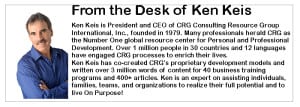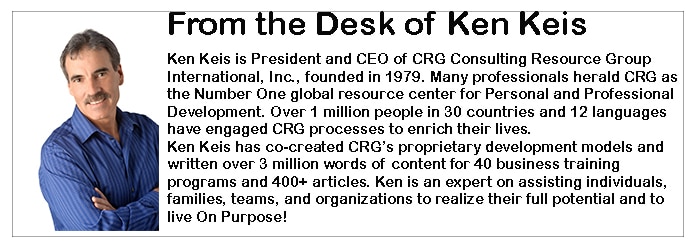

Credibility, a Cornerstone to Your Success
Here are four basic questions for you.
What is your definition of Credibility?
Who, in your opinion, has Credibility?
(What behaviors or character qualities influenced your decision?)
Who, in your opinion, does not have Credibility? (What behaviors or character qualities influenced your decision?)
Why should you care about Credibility?
First, What is Credibility?
Credibility is your reputation for being fair, open, compassionate, inspirational, positive, competent, honest, and trustworthy. It determines the level of respect you will receive. The fact is, if you don’t know a person and he or she doesn’t know you, there is zero credibility; no information is available to make a decision.
Reputation is established based on the behaviors you do and the behaviors you don’t do.
Whether you like it or not, all the people who know you have assigned a certain level of credibility to you. That’s the price you pay for showing up.
You cannot avoid people’s judgment unless you cease to interact with others—like Tom Hanks in the movie Cast Away.
You have a credibility level with the people with whom you work and at the places where you are a purchaser or seller.
You have a credibility level with family, friends, and all others.
Whether you wanted to or not, you have established a level of credibility with just about every person with whom you have interacted.
While we judge our own credibility levels more by our intentions, others judge us almost totally by our actions. It is our behavior—what we actually do and don’t do—that builds credibility with people, not what we had hoped to do. Our good intentions and especially our verbal messages are valid only if they consistently match our behavior, and if our behavior also demonstrates respect toward others.
You may have a particular idea about yourself, but that doesn’t necessarily mean other people have the same idea about you. For instance, while the school bully may have a big reputation on campus, he does not have any credibility with the students. He isn’t liked, trusted, admired, or befriended. He may control situations and events, but he is lonely and will be deserted as soon as the students figure out how to get away from him. His actions destroy his credibility with the people he wants to follow him.
All too often, the same results occur for leaders at work and at home.
You might respond, “I don’t care about credibility with others.”
Okay, let’s address that.
What does Credibility do?
It determines the level of respect you will receive from others.
Note: Credibility is not about people liking you; it is about people respecting you. Keep that in mind as you review your credibility levels in your relationships.
What does Credibility measure?
It measures how trustworthy, honest, and reliable others think you are.
Note: Credibility is based on the perceptions of other people, not on your perceptions.
Where does Your Credibility exist?
It exists in other people’s minds, not in yours.
I personally dislike this truth, but credibility is lent to you from others. You cannot demand credibility from others or force them to think highly of you. Your credibility is in the mind of others; you must earn it by conducting yourself in a way that meets their needs, not yours.
Why should you care about Credibility?
Your credibility influences how much others will communicate to you, cooperate with you, learn from you, and be influenced by you and/or buy from you.
Unless you are part of a dictatorship, credibility means everything to your ongoing success.
Building your credibility means to intentionally increase your success and impact.
Discounting this fact, or being in denial of it, does not lessen the impact that your level of credibility is having in your life. You are simply operating without awareness or acceptance of a critical part of any success model.
Think about it. It takes weeks, months, and years to build credibility, yet you can lose it in a heartbeat. When I mention Wall Street or AIG, what thoughts do you have about credibility? What thoughts do you have about Disneyland? Credibility levels and opinions are unavoidable.
What makes Credibility increase and decrease?
If your behavior, as perceived by the others with whom you are interacting, is deemed to be appropriate for time, tasks, people, situations, and values, your credibility will increase. Behavior perceived as inappropriate for the same factors will make it decrease.
Each moment of interaction with others causes your credibility to go up, stay the same, or go down. And note that I mean behavior seen as appropriate or inappropriate by the other party, not by you.
Credibility applies equally to the sin of omission. We are being judged by what we don’t do as well as by what we do. It is our behavior—what we actually do and don’t do—that builds credibility with people . . . not what we had hoped to do.
Early in our marriage, my wife Brenda was coming home from teaching at our local college. It was late at night and I was sitting at the kitchen table reading the local paper. From my seat, I could see her arrive home. As she got out of the car with an armful of books, I waved and kept reading my paper, not thinking any more about it. When Brenda came in the front door, she was not happy with me (low credibility) because I did not do something, which of course was get up and open the door for her. You see, credibility—yours and mine—can change because of what we don’t do. Yes, I now get up and open doors!
Your success at developing credibility in different environments can vary from situation to situation. Your level of credibility may be very good at home but at work, it could be quite different. For instance, you may have many struggles as a teacher, a police officer, or an executive but you may get along really well within the family unit. Or just the opposite may occur; you may be highly esteemed at work and have problems at home.
The same could hold true for your levels of credibility in the many other roles you play in life—as a neighbor, board member, church member, and so forth. Some levels may be high while others are low.
The bottom line is that each one of us has to earn credibility by what we say and do.
Credibility has three levels.
Self
Others
Organizations
Self
I have mentioned interactions with others. We also have a level of internal credibility with ourselves. You have met individuals who are perfectly capable of fulfilling a task or a request but they actually discount their own worth (credibility) and suggest they are not competent or worthy enough to assume such a responsibility. I will reference this in the holistic factors section about credibility and self-worth levels.
Organization
In addition, every organization creates a level of credibility in the marketplace; there’s no avoiding it. Isn’t it wiser to establish and build your credibility than to destroy it? To build credibility, you must become aware of the way your actions are affecting others. That process will be outlined throughout the new edition of Why Aren’t You More Like Me?
Others
To intentionally increase or maintain credibility with others, we must be aware of what others need and want. Too often, our own point of view determines the way we will act in a situation. That is completely ineffective in building credibility, unless the wants and needs of others are identical to ours—which is highly unlikely.
One of the main factors influencing credibility levels is Personal Style.
Awareness of Personal Style helps us understand the impact we are having with others.
Special Twist on Credibility
It is important to acknowledge that it’s impossible to have high levels of credibility with everyone. That is not a reasonable expectation. In fact, it would be dysfunctional to try to please everyone. No matter what you do, some individuals will feel you are not credible. Some people, no matter what others do, are never satisfied.
In The Road Less Travelled, Scott Peck discusses the most difficult condition to treat—Character Disorder—where people blame everyone else. It is never their fault. Since they take no responsibility for their condition, or the impact of their behavior, why would they consider changing?! They are unaware and often unproductive individuals.
During one of my training sessions, one individual was constantly complaining about everything in the program. That is a rare occurrence but it does happen. We had just taught the section about credibility. The lady went on to state that nobody in the program was credible. She restated our teachings that credibility is based on the other person’s opinion and her opinion was that we all stunk.
At first we stayed in our professional mode, allowing her to express herself in the morning. By the afternoon, she was so disruptive and poisonous, I had to ask her to leave. So no matter how intentional you are to building good credibility with others, sometimes you just have to let it go.
We later learned that her co-workers did not care for her. She was able to keep her job because she was an expert in a special software program used in the organization. That is not a good reason to keep a toxic person, but they did.
The key is for each of us to build credibility—the best we can—and accept that for those with whom we have low credibility, we have done all we can.
A Study on Leadership Credibility
A few years ago, James Kouzes and Barry Posner conducted an indepth study on leadership credibility, which they published in their book Credibility. Through extensive research with large groups of employees from several well-known organizations, the authors identified the attributes that employees consider essential for leadership credibility. The research revealed four predominant qualities or characteristics.
1. Honesty: The Leader tells the truth and is behaviourally ethical.
2. Competence: Each Leader is capable and effective and gets things done.
3. Foresight: Leaders set and define vision and provide direction; they clearly know where they are going.
4. Ability to Inspire: Leaders connect team members’ personal and pprofessional purpose and passions to the vision of the organization and they show how individual contributions matter.
Those four qualities at the top of the list are simply non-negotiable if you want to have credibility in the workplace. Other qualities high on the list include being supportive, fair-minded, dependable, and courageous.
Personal Style Awareness, a Turning Point
The new edition of Why Aren’t You More Like Me? introduces a unique approach to building leadership or personal credibility by showing how understanding and the use of Personal Style preferences can help develop relationships. Regardless of any special abilities we may have, the way we conduct ourselves with others always influences our credibility with them.
By exploring Personal Style preferences, you will learn what the “needs” differences are and how to approach each particular set of needs so that others feel understood and appreciated. When your behavior as a leader or individual meets the needs of others, your credibility level rises; people begin to perceive you as someone who isn’t driven just by personal needs, with no consideration for others.
The awareness learned from understanding Personal Style differences is transforming. If you want to intentionally build credibility with others, you need knowledge of Personal Style—both your style and the style of others.








